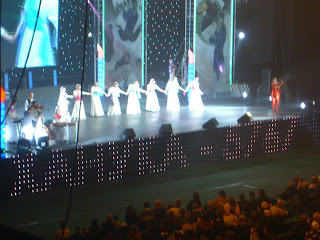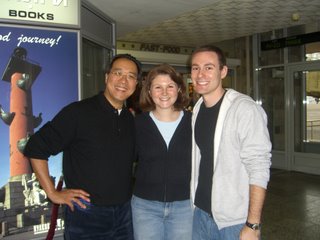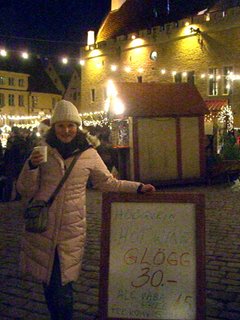
Last night, Alyson and I had a really fun group of guests over to our house. First, we were SO excited to be able to have a nice apartment with lots of chairs, so we can accomodate a large group of people (we're expecting 30 on Sunday for our Chanukah party!). This group was really special: there are 12 Russian teenagers going to Palm Beach, Florida, for 10 days of cultural exchange, Jewish learning, and making new friends (sponsored by the Palm Beach Jewish Federation). So, we decided to have them over for a night of speaking English, talking about America, eating good ol' mac-and-cheese, and preparing them mentally for their upcoming trip. All the pictures are
available here.
It got me thinking, "Wow, I wish I could speak Russian as well as these 15-year-olds can speak English!" But then I started wondering if maybe English is a little easier to learn (disregarding, of course, the fact that I've only been learning Russian for 5 months and some of these students have been learning for 10 years!), because Russian is so difficult. What makes Russian difficult, you ask? I mean, of course there is the Cyrillic alphabet, but you can
learn to read it in about 15 minutes. And then, in class today, Alyson and I received this on one of our worksheets:

Mind you, this is
Russian class, not physics or geometry! Our eyes nearly popped out of our heads! So what makes Russian so darn difficult? Why am I obsessed with talking about it constantly on this blog?
Well, let's start our little Russian lesson - I think you'll find it interesting. First, let's talk about the six cases. What the heck is a case, you might ask? Since English doesn't have cases, this is a totally foreign concept to us Anglos. Basically, a case means that words change based on the context in which they are used. Here is an example: we'll take a very simple word, like "home," and use it in simple contexts. Take a look...
- Nominative Case - the most simple, when the noun is the subject of the sentence - My home is great (dom - pronounced "dome").
- Prepositional Case - remember your prepositions from grade school? - I am in my home (domye).
- Accusative Case - remember your direct objects from school? - I am going home (domoy).
- Instrumental - used with certain prepositions, especially "with" - The plane flew over the house (domom).
- Dative - used with certain prepositions and when talking about an indirect object - I walked around the house (domoo).
- Genitive - totally impossible to explain outside of a classroom - I own five homes (domov) in Florida, and three homes (doma) in Russia.
As you can see, even though there are supposedly only six cases, there are at least seven ways that a noun can change. It's important to note that there are masculine, feminine, and neuter nouns, so you need to know the specific endings for all three genders; you wouldn't want to use a masculine ending for a feminine noun--that would be incorrect grammar! Oh, and did I mention that the adjectives change also? Let's use our example again and you can see what I'm talking about when we add the word "big" (bolshoy) to describe our house, and you can see how that word changes also in a totally irregular and unpredictable way:
- Nominative Case - My big home is great (bolshoy dom - pronounced "dome").
- Prepositional Case - I am in my big home (bolshom domye).
- Accusative Case -- I am going to my big home (bolshoy dom). (Don't be fooled...this would change under different circumstances, I just chose a particular example and had to stick with it...)
- Instrumental - The plane flew over the big house (bolsheem domom).
- Dative - I walked around the big house (bolshomoo domoo).
- Genative - I own five big homes (bolshax domov) in Florida, and three big homes (bolshovo doma) in Russia.
So now you've got a tip-of-the-iceberg understanding of the six cases in Russian, when to use them, and how they influence grammar and speaking. Now let's talk about that bizarre diagram above. I mean, why would you use a diagram to explain language concepts?
Here's why: Russian is infamous for the complexity of its verbs of motion, and only through those arrows can you tell what each verb variant is referring to. To put it simply, it doesn't just matter that you are walking, but the direction and timing of your walking is critical to the verb. Am I just starting to walk (poyedoo)? Am I walking out of the building (ooyedoo)? Am I walking close to the building but not quite reaching it (doyedoo)? Am I walking for just a short time (zayedoo)? I might be in the process of walking towards the building (priyedoo) - but I better not be entering, because that is a different version (voyedoo) and I better not have arrived, because that would be different also (podyedoo)! It gets even more complicated, with more prefixes to denote other actions, and there are tons of other verbs (like driving, swimming, leading someone by the hand, driving them in a car, etc.), but you get the picture.
Why do I dwell on this subject so much? Because I think that unlocking the mysteries of the Russian language helps me understand the paradoxes of Russian culture. How can a people that pride themselves on their hospitality treat Alyson and I so distantly at times? When the culture prizes intellectual activities like dance, music, singing, etc. above all else, why are there so much brutal violence and ignorance present here? Maybe, if I can understand the way they speak, I can understand the way they think. And by unlocking the door to the Russian mentality, perhaps we can be more effective and make a lasting impact in our work here.

 Our camp experience this time around was far more enjoyable, especially since we knew what to expect. We did a better job of bringing kosher food with us, so that we could actually enjoy mealtimes; likewise, we did a better job of bringing books and DVDs to help us enjoy the unstructured free time. We interacted with the children far more, especially since we posted daily trivia questions to our door (yes, in Russian, thanks to the help of our fellow counselors). The kids knocked on our door all hours of the day and night (even when we had a "we're closed" sign up), excited to answer the questions and win candy in exchange. Hopefully, they learned a thing or two in the process.
Our camp experience this time around was far more enjoyable, especially since we knew what to expect. We did a better job of bringing kosher food with us, so that we could actually enjoy mealtimes; likewise, we did a better job of bringing books and DVDs to help us enjoy the unstructured free time. We interacted with the children far more, especially since we posted daily trivia questions to our door (yes, in Russian, thanks to the help of our fellow counselors). The kids knocked on our door all hours of the day and night (even when we had a "we're closed" sign up), excited to answer the questions and win candy in exchange. Hopefully, they learned a thing or two in the process.










